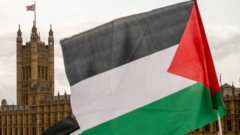Will Starmer Acknowledge Palestinian Statehood?

The Urgent Call for UK Recognition of the State of Palestine
Recent discussions within the UK Parliament have brought forth a significant proposal: the immediate recognition of the state of Palestine. This initiative, backed by a majority of MPs from the Commons Foreign Affairs Committee, arises amidst escalating humanitarian crises in Gaza and a shifting landscape of international diplomacy. The urgency of the situation has prompted key figures, including Prime Minister Sir Keir Starmer, to reconsider the UK's stance on Palestine, especially in light of France's recent announcement of its intent to recognize Palestinian statehood.
The report from the select committee emphasizes that statehood for Palestine is an "inalienable right" that should not be contingent on various political conditions. This sentiment echoes a growing consensus among Labour and Liberal Democrat MPs, who argue for immediate action rather than waiting for an ideal political scenario that may never materialize. The report’s authors assert that delaying recognition risks the viability of a Palestinian state, which they contend is currently under threat.
Political Dynamics and Divergent Views
The political landscape surrounding the recognition of Palestine is complex and layered. While Labour and Liberal Democrat MPs advocate for immediate recognition, their Conservative counterparts maintain a more cautious approach. Tory members of the committee argue that recognition should only occur as part of a comprehensive two-state solution to the Israeli-Palestinian conflict. This division highlights the broader ideological split within UK politics regarding foreign policy in the Middle East.
Support for immediate recognition is growing, with approximately 60 MPs signing a letter urging the UK government to take decisive action. Even London Mayor Sir Sadiq Khan has joined the chorus, calling for a swift acknowledgment of Palestinian statehood. This collective pressure is in response to the dire humanitarian conditions reported in Gaza, where warnings of mass starvation and civilian suffering have prompted calls for urgent international intervention.
International Context and Implications
France’s recent declaration that it will formally recognize a Palestinian state at an upcoming UN meeting adds a significant dimension to this debate. French President Emmanuel Macron's announcement underscores the shifting attitudes among European nations toward Palestinian statehood, especially as countries like Spain, Ireland, and Norway have already taken steps to recognize Palestine. This shift might not only influence the UK's stance but could also catalyze broader European support for Palestinian aspirations.
However, the recognition of Palestine is not merely a diplomatic gesture. It involves a myriad of implications for international relations, humanitarian aid, and political stability in the region. Critics of immediate recognition argue that without addressing key issues such as leadership legitimacy and territorial boundaries, the act could end up being largely symbolic. These concerns reflect the complex realities on the ground, where Palestinian governance remains fragmented and lacks widespread international support.
The Humanitarian Crisis in Gaza
The humanitarian situation in Gaza is increasingly dire, with reports of severe shortages of food, water, and medical supplies. The UK government, along with 27 other countries, has condemned the ongoing humanitarian crisis and the "drip feeding of aid" to civilians. This condemnation highlights the urgent need for a coordinated international response to alleviate suffering in Gaza.
As the UK navigates its foreign policy decisions, the call for a UN-led system to distribute aid in Gaza has emerged as a potential solution. This system would replace the current US-backed Gaza Humanitarian Foundation, which has faced criticism for its effectiveness and transparency. The MPs’ report stresses the need for a robust framework to ensure that aid reaches those most in need, while also addressing the broader political context that has led to the current crisis.
Challenges to Recognition
Despite the momentum for recognition, several challenges remain. Skeptics within the UK government argue that recognizing Palestine as a state could complicate the already intricate dynamics of the Israeli-Palestinian conflict. They emphasize that such a move should be contingent on clear leadership and defined borders, which are currently lacking in the Palestinian territories. This perspective reflects a cautious approach to foreign policy, prioritizing stability and long-term solutions over immediate recognition.
Moreover, former UK Foreign Office officials have voiced concerns about the implications of recognition without a clearly defined Palestinian state. They argue that recognition itself may hold little value unless accompanied by substantive political progress and an agreement on the governance structure of a future Palestinian state. This debate underscores the complexities involved in recognizing statehood in a region fraught with historical grievances and ongoing conflict.
Future Prospects for Palestinian Statehood
The discussion surrounding Palestinian statehood is not merely a political issue; it is deeply intertwined with the aspirations of millions of Palestinians who seek recognition and autonomy. As the international community grapples with the urgent humanitarian crisis in Gaza, the question of statehood becomes increasingly pressing. The MPs’ report advocates for a proactive approach, urging the UK government to take a stand before the opportunity for recognition diminishes further.
As we look ahead, the UK's decision will likely have wide-ranging implications for its role in international diplomacy, humanitarian efforts, and its relationship with both Israel and Palestine. The recognition of Palestinian statehood could signify a shift in the UK's foreign policy approach, aligning it more closely with the growing international consensus on the need for a Palestinian state.
Conclusion and Call to Action
In conclusion, the push for the UK to recognize the state of Palestine is gaining momentum amidst a backdrop of humanitarian crisis and shifting international dynamics. As calls for immediate action grow louder, the UK faces a critical juncture in determining its foreign policy direction. The implications of this decision will extend far beyond the UK, potentially influencing the broader geopolitical landscape in the Middle East.
This moment calls for reflection on the responsibilities of nations in addressing humanitarian crises and supporting the rights of peoples seeking self-determination. As the UK navigates these complex waters, it must weigh the moral imperative of recognition against the practical realities of the ongoing conflict. How should the UK position itself in this evolving landscape, and what role can it play in fostering a lasting peace in the region?
FAQs
What is the current status of Palestinian statehood recognition in the UK?
As of now, the UK has not officially recognized Palestine as a state, although there is a growing movement within Parliament advocating for immediate recognition. The Commons Foreign Affairs Committee has issued a report urging the government to make this move, citing the urgent humanitarian crisis in Gaza and the inherent right to statehood for Palestinians.
Why do some MPs believe immediate recognition is necessary?
Many MPs argue that immediate recognition of Palestine is essential to ensure that there is still a state to recognize, given the deteriorating conditions in Gaza. They believe that statehood is an inalienable right that should not be contingent on other political developments, emphasizing the need for a proactive approach to support Palestinian aspirations.
What challenges does the UK face in recognizing Palestine?
The UK faces several challenges, including internal political divisions, concerns over the legitimacy of Palestinian leadership, and the implications for its relationship with Israel. Critics argue that recognition should only occur within the context of a broader peace solution, while supporters believe that delaying recognition risks undermining Palestinian statehood altogether.
The recognition of Palestine is a pivotal issue that embodies the struggle for self-determination and human rights. As the UK contemplates its position, it finds itself at a crossroads between moral imperatives and pragmatic considerations. How will history judge its actions in this critical moment? #Palestine #UKPolitics #Statehood
```Published: 2025-07-25 03:40:06 | Category: sport



